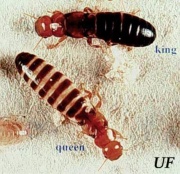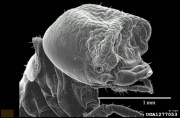Difference between revisions of "Termite"
m (Text replace - "== Authority ==" to "== Sources Checked for Data in Record ==") |
|||
| Line 1: | Line 1: | ||
| − | [[File:termitewk1.jpg|thumb|Adult termites | + | [[File:termitewk1.jpg|thumb|Adult termites ''Incisitermes minor'']] |
| − | |||
| − | ''Incisitermes minor'']] | ||
== Description == | == Description == | ||
| Line 11: | Line 9: | ||
termites; white ant | termites; white ant | ||
| − | == | + | == Physical and Chemical Properties == |
| − | |||
| − | |||
| − | |||
| − | |||
| − | + | * May produce deep holes or craters. | |
| + | * May destroy the interior while allowing the out surface to remain intact. | ||
== Additional Images == | == Additional Images == | ||
| Line 26: | Line 21: | ||
</gallery> | </gallery> | ||
| + | ==Resources and Citations== | ||
| + | * MuseumPest.net at [https://museumpests.net/ Link] | ||
| − | + | * University of Florida, Department of Entomology and Nematology at http://creatures.ifas.ufl.edu/urban/termites/c_cavifrons.htm (accessed Dec. 2004) | |
| − | |||
| − | * | ||
* Lynda A. Zycherman, J.Richard Schrock, ''A Guide to Museum Pest Control'', FAIC and Association of Systematics Collections, Washington DC, 1988 | * Lynda A. Zycherman, J.Richard Schrock, ''A Guide to Museum Pest Control'', FAIC and Association of Systematics Collections, Washington DC, 1988 | ||
Latest revision as of 10:18, 8 June 2022
Description
Pale, soft-bodied insects that feed on wood. Termites belong to the Isoptera order. They are social insects whose colonies can contain over a million insects. The white-color, wingless workers range in size from 4.5 - 8.0 mm long. The build the nest and tend the eggs. The soldiers are light brown with dark brown wings and are slightly larger (4.5-8.0 mm long). Adult termites have strong jaws can burrow through just about any type of wood. They damage papers, books, clothing, carpets, and building structures. Termites can eat the interior of a piece of wood while leaving a thin outer shell untouched. Drywood (Kalotermitidae species) termites usually live in structural wood or furniture. They are detected by small piles of frass or by swarms. Subterranean (Rhinotermitidae species) termites nest in the soil and feed on nearby wood. They are often detected by their mud tunnels that connect the nest to the food source or by swarms.
Synonyms and Related Terms
termites; white ant
Physical and Chemical Properties
- May produce deep holes or craters.
- May destroy the interior while allowing the out surface to remain intact.
Additional Images
Resources and Citations
- MuseumPest.net at Link
- University of Florida, Department of Entomology and Nematology at http://creatures.ifas.ufl.edu/urban/termites/c_cavifrons.htm (accessed Dec. 2004)
- Lynda A. Zycherman, J.Richard Schrock, A Guide to Museum Pest Control, FAIC and Association of Systematics Collections, Washington DC, 1988
- G.Caneva, M.P.Nugari, O.Salvadori, Biology in the Conservation of Works of Art, ICCROM, Rome, 1991
- Van Nostrand's Scientific Encyclopedia, Douglas M. Considine (ed.), Van Nostrand Reinhold, New York, 1976
- The American Heritage Dictionary or Encarta, via Microsoft Bookshelf 98, Microsoft Corp., 1998
- Hermann Kuhn, Conservation and Restoration of Works of Art and Antiquities, Butterworths, London, 1986



